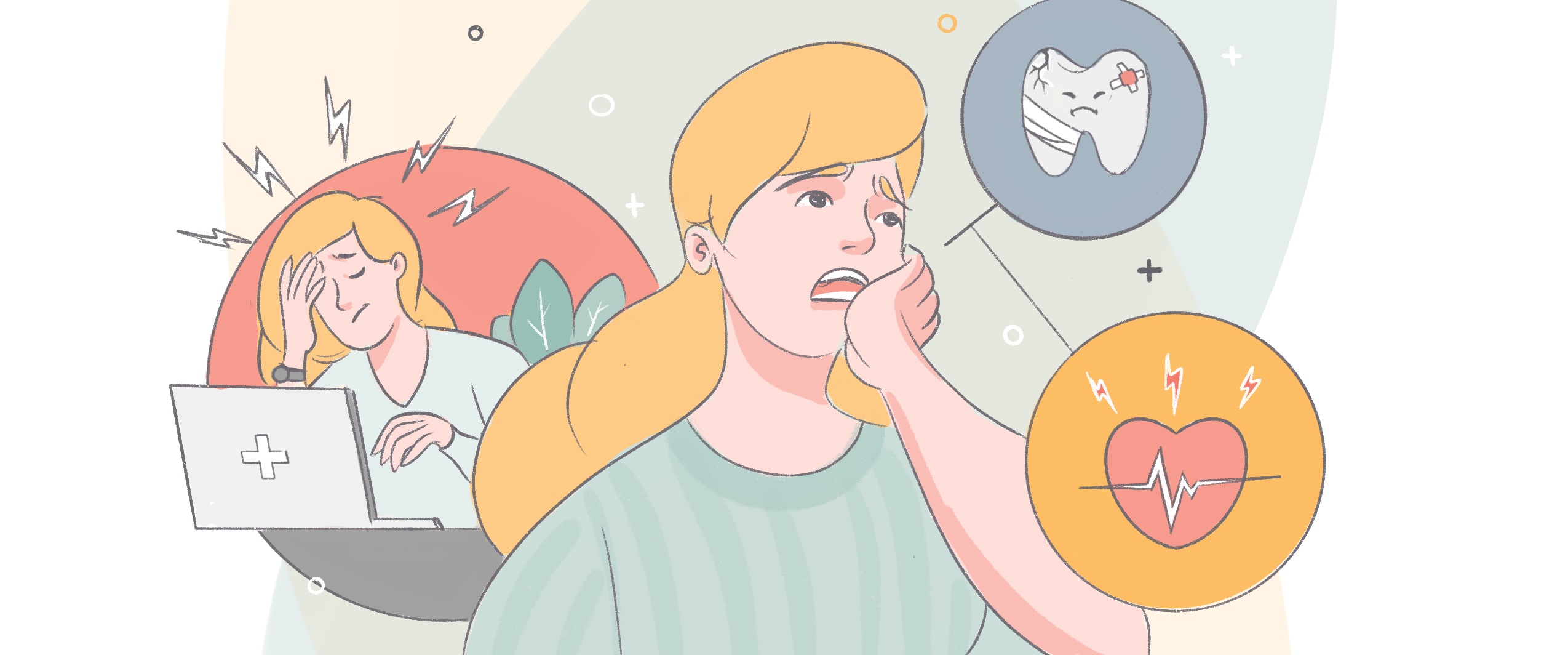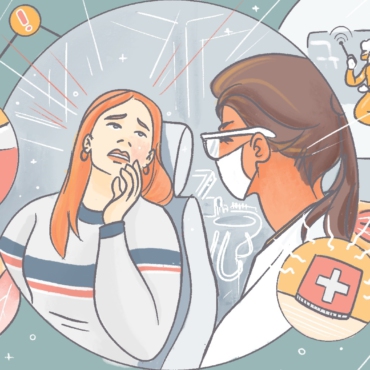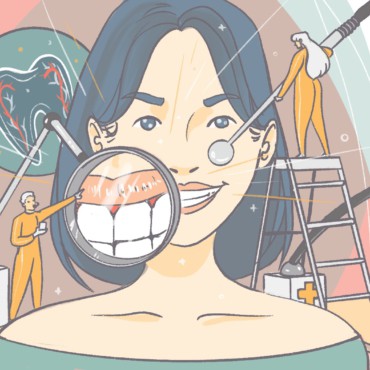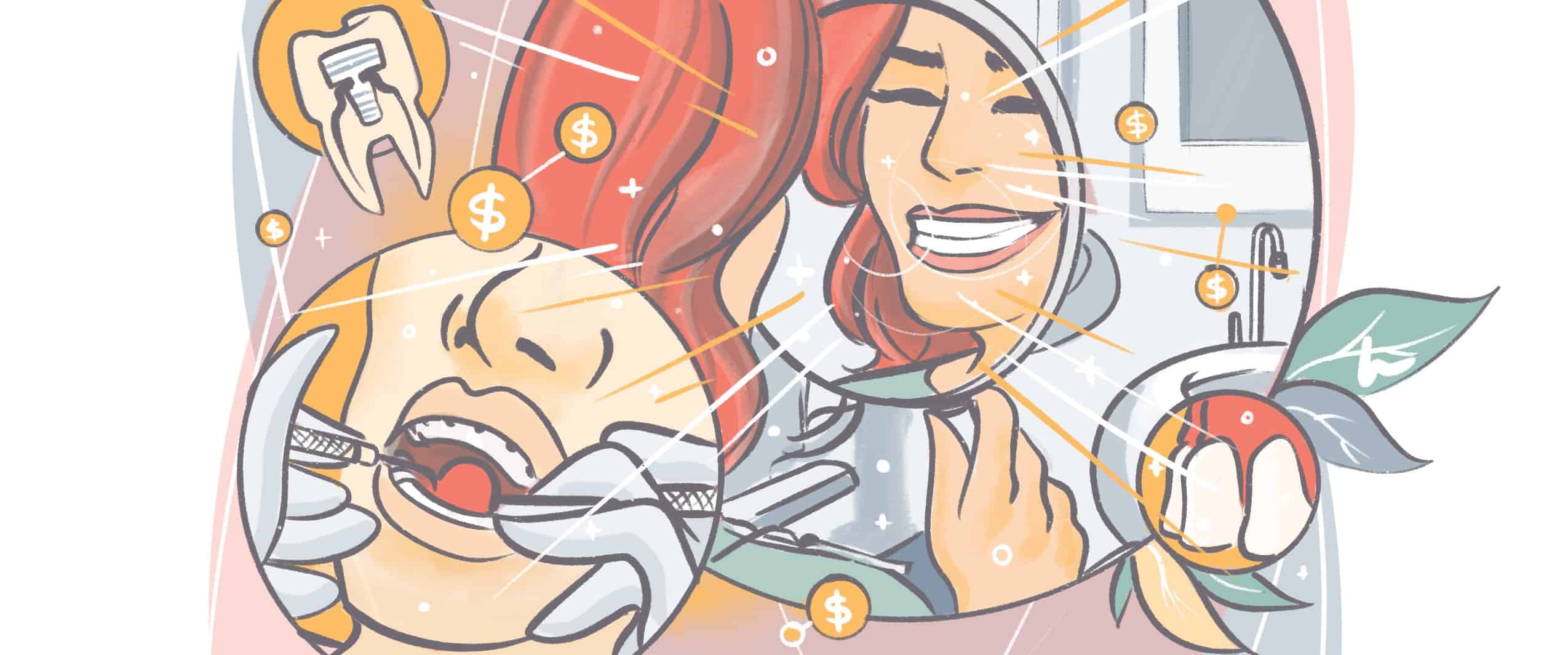Does taking a bite out of your lunch or yawning make you say “ouch?” You may not know what’s causing that jaw pain, or why eating is suddenly excruciating, but you sure know that that jaw pain hurts. It can seem overwhelming, and even frightening when you’re unsure how long it will last or it doesn’t seem to subside, but there are ways to mitigate jaw pain.
In this piece, we’ll explore some of the frequent causes of jaw pain from temporomandibular joint disorder to lesser-known causes like teeth grinding. And for those currently suffering from pain in your jaw, we’ll also provide some easy at-home remedies and tips for how to get medical help to treat severe cases.
8 Leading Causes of Jaw Pain
A variety of issues can cause the pain you’re experiencing. Here are some of the common sources:
Temporomandibular Joint Disorder
The temporomandibular joint connects the jaw bone to the skull, acting “like a sliding hinge” according to the Mayo Clinic. When this joint becomes injured or affected by a condition such as arthritis, you can end up with jaw pain. Take a listen when you open and close your mouth, if you hear a clicking sound or feel pain around the face, ears, or jaw, these are all common symptoms of TMJ.
Temporomandibular joint (TMJ) disorder is more common than might be widely known, with the National Institute of Dental and Craniofacial Research estimating that more than 10 million Americans experience TMJ. Up to 12 percent of people are affected. Less than half seek treatment, with “the majority of those seeking treatment… women in their childbearing years” according to the National Women’s Health Network.
Due for a checkup?
Find a top rated dentist near you that takes your insurance.
Trauma
Take a blow to the jaw and it can easily lead to bruises, swelling, and knocked out teeth — all things that affect the ability to chew comfortably and open and close the mouth without pain.
WebMD notes that soft foods and over-the-counter pain medication can typically ease discomfort, adding, “But if the pain won’t go away, or you can’t open and close your mouth right, you’ll need medical care.”
Sinus Infections
Feeling congested? Breathe America noted the connection between sinus infections and jaw pain: “Sinus infections usually cause swelling, and when that swelling becomes severe, it can even reach to your jaw.” Seek medical help for your infection and with treatment, the ache should subside as your other symptoms lessen.
Dental Issues
Failing to regularly brush and floss and get in for dental cleanings won’t just cause yellow teeth and some funktastic breath. It might also lead to jaw pain.
Any number of different dental issues can cause jaw pain, including:
- Untreated cavities: Discomfort is typically felt when the cavity is deep enough to affect the dentin, the layer of tooth underneath the enamel. “If it continues down into the pulp of your tooth, it can cause pain to radiate around your jaw,” SELF Magazine notes.
- Impacted wisdom teeth: Many people get their wisdom teeth removed in their teen or early adult years. This is due in part to the havoc these teeth, located at the back corners of the mouth, can wreak on the jaw. St. John Health noted that impacted wisdom teeth make the jaw “stiff, sore, and difficult to open.”
Arthritis
Around 35 percent of people with psoriatic arthritis experience jaw pain according to Medical News Today. People with rheumatoid arthritis and other joint problems also have jaw issues, which can have detrimental, and painful, effects on drinking, eating, and sleeping.
Tetanus
Tetanus, also known as lockjaw, is a disease that results from tetanus bacteria getting into the body through a puncture wound. Infection leads to muscle spasms that lock the jaw closed.
Heart Attack
Jaw pain can be easy to ignore or rationalize away as a seemingly unavoidable part of life. However, sometimes, it can be a symptom of much deeper issues.
The American Heart Association lists various heart attack warning signs on its website, including “pain or discomfort in one or both arms, the back, neck, jaw, or stomach.”
For many reasons, it’s best to not ignore pain in your jaw when it pops up. In this case, checking with a medical professional might save your life.
Stress
Stress, that feeling of having insufficient resources to deal with whatever’s going on in your life at the moment, has physical manifestations. One of them is teeth grinding which can lead to tooth damage and jaw soreness.
5 Home Remedies for Getting Rid of Jaw Pain
Oral pain is no fun to deal with. That said, here’s some good news: There are many ways to deal with it.
Below are some initial strategies to take which can provide relief. They can also help assess if jaw problems are severe enough to merit medical attention.
Over-The-Counter Medication
Good old ibuprofen.
Athletes are familiar with this all-purpose pain reliever after a tough workout. Turns out ibuprofen is a staple at the dentist’s office as well, able to bring relief to affected jaws.
Acetaminophen, often in the form of Tylenol, is another popular over-the-counter remedy for pain in your jaw, “but it doesn’t address inflammation,” PracticalPainManagment.com notes.
Dentists and doctors will often have patients attempt over-the-counter solutions before prescribing medication, so you may want to start with this course of action when treating minor pain of the jaw.
Stick to Soft Foods
If you’re experiencing temporary jaw pain, you may want to stick to soft foods so as not to aggravate it.
Per WebMD, some of the foods that can help ease pain include mashed potatoes, yogurt, cottage cheese, scrambled eggs, soup, cooked fruits and vegetables, beans, grains, and even fish.
Brittle foods like pretzels or tough foods like cheap steak are to be avoided. While they might be tasty, your jaw is going to feel worse afterward. Embrace the soft foods today so you can heal tomorrow.
Hot and/or Cold Compresses
The TMJ Association notes that the most common intervention for jaw pain, used by 65 percent of respondents to a survey it conducted, was hot or cold compresses to the jaw. The best part? 74 percent of these respondents reported a reduction in their symptoms. Simple but effective.
Applying a compress to an affected jawline can be as simple as wetting a washcloth and popping it in either the microwave or freezer, but more sophisticated solutions are also available for purchase online or at your local pharmacy.
Massage Therapy
Massage therapy can work wonders for alleviating jaw pain. PainScience broke down how to massage the masseter muscle, which hangs from the underside of the cheekbone.
“Although the entire muscle can be rubbed gently, most people will find that the satisfying sensation of a Perfect Spot for massaging is limited to the upper edge of the muscle,” the author wrote.
Long-Term Lifestyle Practices
Many different lifestyle practices can help reduce pain.
Yoga and mindful meditation, both of which can reduce stress and teeth grinding, are alternative methods for dealing with pain in your jaw. These are excellent ways to reduce stress but these efforts on their own might not solve your current jaw pain, so while you’re trying other methods using these practices could help prevent future issues.
Sleeping on your back or adjusting your sleep schedule may help address any deficits which are contributing to jaw and overall muscle fatigue. Making dietary changes such as avoiding chewy foods, limiting caffeine (which can cause muscle soreness), and adding calcium supplements can also help prevent pain before it ever starts.
Due for a checkup?
Find a top rated dentist near you that takes your insurance.
Getting Medical Help For Jaw Pain
If you’ve tried home remedies and jaw pain persists, it might be time to take the next step and contact a medical professional.
While doctors, dentists, and others within the health community can’t wave a magic wand to immediately rid sufferers of jaw pain, they have various tools to address the issue at its root and help find a solution.
Here is how to go about getting medical help for pain in your jaw.
Tests Medical Professionals May Use to Diagnose and Treat Jaw Pain
Doctors, dentists, and other medical professionals have a broad assortment of tests and diagnostic tools for assessing jaw pain. These can include:
- Basic examinations: a doctor or dentist may listen to and/or feel your jaw while you open and close your mouth
- More in-depth examinations: may include a full physical
- Dental x-rays
- Blood tests: this typically isn’t needed unless an autoimmune condition is suspected
- Psychological examination: bodily pain can sometimes be based in the psyche
- Magnetic resonance imaging (MRI): An MRI may assess joint disk or soft tissue problems. However, it’s important to note that MRIs have their limitations in helping treat jaw pain. A University of Minnesota study of 85 patients concluded that “palpation of the (temporomandibular joint) is more accurate than MRI-depicted effusions in identifying the (temporomandibular joint) as the source of pain for patients with unilateral jaw pain.”
A dentist or doctor might employ a combination of these tests to determine what’s going on and begin treatment for pain in your jaw
Jaw Pain Treatments
Once a medical professional has performed the necessary tests and diagnostic assessments, they can move to treatments for oral pain.
Treatments may include:
- Prescribed medications: these can include anticonvulsants, muscle relaxants, and anti-inflammatory medication
- Self-care: a good doctor can help a person develop more refined jaw pain reduction strategies that revolve around a focus on self-care that leads to stress reduction
- Mouthguard: helpful for cutting down on teeth grinding
- Botox injections: No longer just a way for making Hollywood celebrities look 10 years younger, botox can provide extra padding for the jaw. An Allure magazine writer tried botox to deal with her pain, with positive results: “After one week, I notice that my headaches are not as frequent and my jaw hurts less, but it’s still swollen and lopsided. By week two, I’m sleeping better and can chew real food without wanting to rip my face off.”
- Jaw surgery: surgery may involve arthroscopy or damaged tissue repair, according to the American Association of Oral and Maxillofacial Surgeons
Suffering from oral pain? You don’t have to be. Use Opencare to find a good dentist in seconds and start feeling better today.
Due for a checkup?
Find a top rated dentist near you that takes your insurance.








